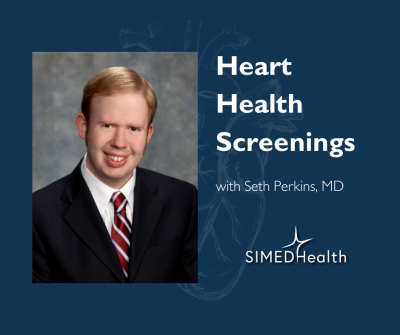
Heart Health Screenings
Dr. Seth Perkins, a Family Medicine and Geriatrics physician at SIMEDHealth, examines the role of screening tests, genetics, and home monitoring in maintaining cardiovascular health. He addresses the use of medications and emphasizes the significance of lifestyle habits such as diet and exercise to reduce heart-related issues.
To schedule an appointment with Dr. Seth Perkins in Lady Lake, click here.
1. What history do you obtain to help you evaluate one’s cardiovascular health?
Getting complete histories from patients is vital to evaluating cardiovascular health. I ask about any diseases or illnesses that they have, as well as how they are managing these conditions. I want to know if they have had any surgeries or procedures related to the heart or the blood vessels, and if they are taking medications. I find it highly valuable to ask about diet and exercise, as making adjustments in these areas can improve cardiovascular health and reduce the risk of developing disease. For the same reasons, asking about smoking history, alcohol intake, and drug use is important. Additionally, a history of cardiovascular disease in the family, with a particular emphasis on learning about their parents and siblings.
2. Do genetics and family history increase one’s risk of heart disease?
Genetics and family history can increase the risk of developing heart disease. Certain conditions can be inherited from parents, and these may need testing and close follow-up appointments with your physician. However, genetics and family history only represent part of the evaluation of a patient’s risk of developing cardiovascular disease. I also look at lifestyle factors such as diet, exercise, and smoking. Patients and their physicians can work together and develop plans to change what they can in order to lower any cardiovascular risks.
3. Are there screening tests used to monitor cardiovascular health?
Perhaps the simplest screening test is checking your blood pressure. If your blood pressure is too high, you are at increased risk for severe outcomes such as a heart attack or a stroke. Although blood pressure provides a great deal of information, it cannot be relied on solely to assess cardiovascular disease or risks.
Other tests used to monitor cardiovascular health come from the blood. Specifically, cholesterol and blood glucose (or “blood sugar”). High cholesterol puts patients at higher risk for cardiovascular disease, and the presence of diabetes does as well. Monitoring these labs regularly allows the patient and their medical team to stay on top of their health and make appropriate plans to reduce risk and prevent disease.
4. How can one help monitor their cardiovascular health on their own?
Having an idea of one’s blood pressure, by having a blood pressure cuff available at home can be helpful. If you don’t have one at home, some gyms and stores have blood pressure machines. Keeping track of diet and exercise patterns is also helpful, as is monitoring weight.
Smart phones have revolutionized how we think about and monitor our health. There are apps allowing us to track of the number of daily steps taken, our weight, our blood pressure, and so much more. There are also apps that monitor heart rate and can even perform EKG’s (when used with a special device) to evaluate the heart’s rhythm and activity.
5. Are there medications that help manage or lower the risk of heart disease?
Several different medications are available for treating high blood pressure, high cholesterol and diabetes, and in turn these help manage or lower heart disease risk. There are also some medications available to treat a specific condition, that have also been found to have good effects on the heart (i.e. they can lower the risk of cardiovascular disease). For example, some diabetes medications have been found to not only improve diabetic control but also to lower the risk of serious or fatal outcomes in people with certain heart conditions. A discussion with your physician will help in determining what medication is best for you.
6. What role does lifestyle play in heart health, and what habits help reduce the risk of heart-related issues?
Lifestyle plays a large role in cardiovascular health. Certain bad habits, such as engaging in little to no physical activity, eating a diet low in healthy nutrients, or smoking can increase the risk of developing cardiovascular disease. Even people who have good genes or no family history of cardiovascular disease are at risk if they have poor lifestyles. The good news is these habits can be changed. Beginning a heart-healthy diet is a good step. This diet should include fruits, vegetables, whole grains, and healthy proteins. It should be low in sodium (salt), added sugars (carbohydrates), processed foods, and alcohol. Although a good diet is important, additional steps to help the heart are necessary.
Aerobic exercise is also important for improving cardiovascular health. Aerobic exercise, improves blood flow throughout the body and includes activities such as running, brisk walking, riding a bicycle, and swimming. In addition, weight training and stretching are important components of a good exercise plan. Talk to your physician to determine what plan is best for you.
Another important thing to do to lower the risk of cardiovascular disease is stopping smoking. Not only does this lower the risk of developing disease in the first place, but also lowers the chance of already present cardiovascular disease getting worse. It is also worth noting that, after you stop smoking, the risk of developing cardiovascular disease decreases with time.